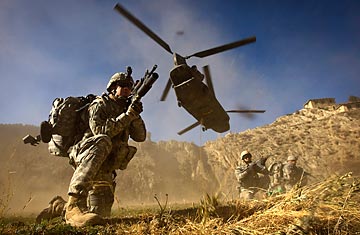
U.S. soldiers take position in Khost Province, where it has been reported that at least 8 Americans were killed in a suicide attack.
Updated
The U.S. intelligence community is reeling from one of the worst days in the CIA's history: the death of seven employees in a suicide bombing in Afghanistan on Wednesday. In keeping with its practice, the Agency will not comment on the deaths until it has formally informed the families of those killed. But several former CIA officers tell TIME the deaths will cast a pall over the Agency. "People walking into [CIA headquarters in Langley, Virginia] will look at that Memorial Wall in a different way today," one former operations hand. "On a day like this, you want to stop in front of those black stars and bow in silence." There are currently 90 stars on the CIA's Memorial Wall at the Agency's headquarters: each star represents an employee killed in the line of duty. Many of their names remain secret.
Because of the very nature of their work, the death of CIA employees is rarely reported, and it can take years for the Agency to acknowledge them with a star. "We avoid publicity over our tragedies," says the former operations hand. "The American public doesn't always know when it happens." Early reports had the toll at eight but a memo released on Thursday from CIA Director Leon Panetta put the number at seven. The Agency waited until it had informed the families of the victims before confirming the deaths. "Families have been our Agency's first priority," Panetta said in his memo. "Before sharing this information with anyone else, we wanted to be in contact with each of them. This is the most difficult news to bear under any circumstances, but that it comes during the holidays makes it even harder."
But there's no hiding the latest tragedy: the seven killed on Wednesday in Khost, near the border with Pakistan, were victims of a suicide bombing at a forward operating base. The bomber seems to have targeted a gym at the base and appears to have simply walked in. Says Bruce Reidel, a former CIA officer and author of President Obama's first Afghanistan-Pakistan review: "This underscores the Afghan war is going to be long and costly. The enemy has come to know us better than we know them. Reversing that intelligence gap is imperative and hard to do."
It's unclear how the bomber gained access to the base, but reports say the CIA has used it to recruit Afghans. "It is important to remember that the mission of the CIA in Afghanistan is to work closely with Afghans," says Robert Grenier, a former CIA stationchief in Pakistan. "That mission necessarily carries a high degree of risk, especially given the prevalence of suicide bombers."
Supposedly secure Western fortifications have been attacked before in Afghanistan. In October, five British soldiers were killed when an Afghan policeman fired on a U.K. training team inside a checkpoint in Helmand Province. But Grenier says that given the breadth and depth of the CIA's operations in Afghanistan, the death toll among employees has been "almost miraculously light." He adds: "Fate may have caught up with us today." The Khost death toll is second only to the record for the number of CIA staffers killed in a single day. On April 18 1983, eight members of the Agency were killed when the US Embassy in Beirut was blown up by a Hizballah suicide bomb. A retired officer who was then in active service says the Agency "was in shock for about one day... and then we got mad."
Khost is just across the border from North Waziristan, the lawless Pakistani tribal area from where al-Qaeda and the Taliban routinely launch attacks on U.S. and NATO positions in Afghanistan. The Taliban has already claimed responsibility for Wednesday's attack, but U.S. authorities have released few details. "We mourn the loss of life in this attack," State Department spokesman Ian Kelly said. Hank Crumpton, who headed the CIA's counterterror ops in Afghanistan after 9/11: "This horrible attack underscores the risk that CIA officers, men and women, undertake every day in Afghanistan and around the world. They are America's most important resource in this war, and this is a tragic blow."
